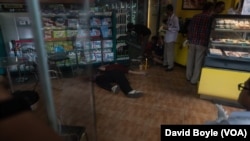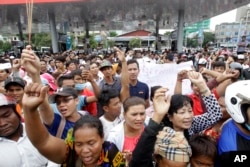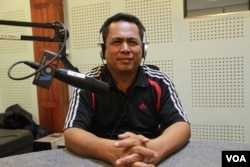Prominent Cambodian political activist and commentator Kem Ley was shot dead in broad daylight while sitting in a coffee shop at a gas station in Phnom Penh Sunday.
The popular public figure was an outspoken critic of the government and the founder of the Grass Roots Democracy Party.
His killing has intensified growing public outrage at the government of Prime Minister Hun Sen, with a large crowd of protesters at the scene convinced this was just the latest act in a wave of government intimidation of opposition politicians and civil society ahead of elections next year.
An eyewitness, who asked reporters to conceal her identity, said two men walked into the shop where Ley was drinking coffee and shot him in the head repeatedly at point blank range.
National Police spokesman Kirt Chantarith said a suspect had been arrested who told them he had shot Ley over a debt. He did not give the suspect’s name.
“He was shot at about 9 a.m. We arrested one of the suspects by 10 a.m. - we found him with a gun.
“After questioning him, he said he lost some of his land because Kem Ley had not paid his debt to him. It is a $ 3,000 debt. But we don’t believe him yet, this is under investigation,” he said.
In a video taped confession circulating online, the suspect bizarrely claimed his name was Chuab Samlaap, which translates to "meet death" in Khmer.
Ley’s body remained in a pool of blood at the Caltex coffee shop for hours as protesters refused to let police remove the corpse. Police at the scene blocked one of Ley’s relatives, an aunt, from seeing the body as anger boiled over.
Eventually police relented and hundreds, perhaps thousands of people marched through the streets with his body in a car filled and surrounded by family, heading to Wat Chak pagoda to commence his funeral.
Global Witness report on PM Hun Sen
Luon Sovath, a monk and prominent rights activist who has himself repeatedly been the target of government intimidation, noted that Ley had spoken at length the previous day about a highly provocative Global Witness report that revealed some of Prime Minister Hun Sen’s family’s fortune and vast business empire.
“Kem Ley had analyzed that issue. It is such a very sensitive story since it is a hot issue now, that combination cost him his life,” he said outside the mart.
“It shows the political threat - kill one to scare the 15 million people. It’s meant to scare all the intellectuals; the other political analysts will not dare analyze the truth.”
Another prominent activist, Tep Vanny, said the failure of the courts to find justice for Chea Vichea, a unionist who was murdered in 2004, and Chut Wutty, an environmentalist who was gunned down in 2012, left her with little faith Kem Ley’s murder would be handled any differently.
“We can see that other nationalists such as Chea Vichea and Chut Wutty were shot and no suspects were arrested. The question is why? Because they [the government] are involved,” she said.
The U.S. embassy tweeted that it was shocked and saddened by Ley’s murder and expressed its condolences to his family.
Kem Ley was a charismatic and immensely popular political figure who frequently criticized both the government and the opposition for failing to implement democratic structures within their own parties. He sought to generate greater public participation in politics, but maintained he sought no political ambitions for himself.
He was particularly popular on radio – a medium that remains one of the most powerful in Cambodia because of its deep reach into rural areas.
Government's crackdown
In recent months the government has made sweeping arrests of opposition members and outspoken members of civil society, repeatedly threatened the media and launched a sustained attack on deputy opposition leader Kem Sokha.
The Cambodia National Rescue Party deputy leader remains holed up in CNRP headquarters trying to avoid a charge related to allegations he engaged in prostitution and corruption by having an extra-marital affair.
Cambodians are set to head to local elections next year and a national ballot the following year, having almost voted the ruling party out of its more than three decades in office in 2013.








